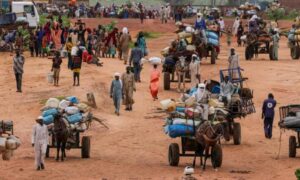
The bombing started at midnight. According to local residents, Sudanese army aircraft hit an industrial area in El Daein, the capital of East Darfur state, then the city’s main market and at least two other neighbourhoods.
In total at least 10 people died in the attack in the early hours of Tuesday morning, including two refugees from South Sudan and six people displaced from elsewhere in Darfur. Dozens were injured, and hundreds of homes reportedly destroyed.
Yagoub Siddig, a resident of one of the bombed neighbourhoods, said: “It was very scary, we lost people … an entire family died in the east. A lot of houses were destroyed, especially those built with local materials. It feels like they [the army] want us to flee.”
This week’s raid was the third by the army since its rival, the Rapid Support Forces, took control of the city in late November. The RSF said civilians had been killed. The army said it had destroyed an RSF weapons depot and that several “field commanders and Dagalo terrorist mercenaries” were killed, referring to the RSF leader, Gen Mohamed Hamdan Dagalo.
Internet and mobile networks have gone down in the city, hampering detailed, independent assessments of what happened.
The deadly bombing raid was yet more evidence that Sudan’s 10-month conflict, pitting the army against the RSF, shows no sign of abating. Millions of people have been displaced by the fighting, and malnutrition is rife. Earlier this month the UN warned of an “epidemic of suffering” in the country.
In recent months, El Daein’s population has swollen with people displaced by fighting from elsewhere in Darfur, a vast region in west Sudan where the RSF is cementing its hold.
Some have come from Geneina, the capital of West Darfur state, itself subjected to repeated bombing raids by the army. Attacks from the air on RSF-controlled territory appear to be the army’s only option as it struggles to stem the tide of RSF gains. For those living in affected areas, conversations are dominated about how to get out, and where to go.
On a recent visit by the Guardian to the village of Ardamata, situated on the road linking Geneina to its airport, a crowd of people were trying to sell their furniture in order to finance an escape to neighbouring Chad. Recent airstrikes had hit the airport and the village, sowing terror among residents.
